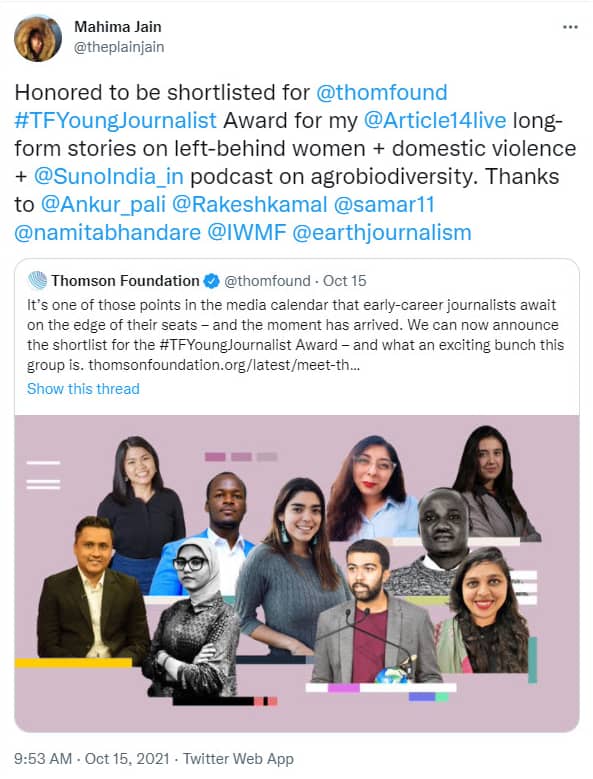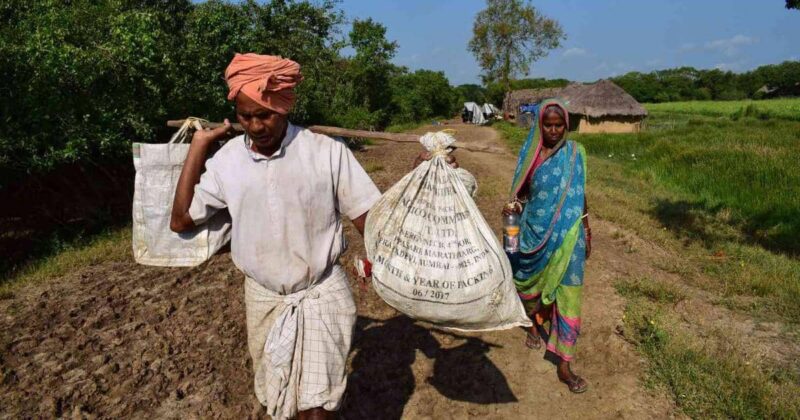Updates from Internews’ Earth Journalism Network
“It is possible to do good environmental pieces that don’t necessarily have a direct human impact angle. Some excellent narrative pieces can focus on non-human elements and make them characters in the piece, such as a seed, or an animal, or even a landscape.”
Sam Schramski, EJN special projects editor.(In the European Journalism Centre’s new guide for freelance journalists reporting on climate change.)
Our network of journalists continues to prove that climate and environmental media is key for real change on the ground. From Odisha, India, we share the story of an EJN grantee who covered the impacts of sea level rise; renewed government support for displaced coastal communities soon followed. In Mongolia, in a first-of-its-kind initiative, an EJN media grantee trained journalists to report on the country’s most pressing biodiversity issues. In Southeast Asia, our special reporting project continues to spotlight investment in fossil fuels. Globally, 11 journalists won EJN story grants to report on ocean issues worldwide and our Indigenous grantees are fast gaining recognition for their work.
We’re also announcing two new grant opportunities: We want to hear from journalists highlighting untold threats to global biodiversity and conservation, and we are seeking story ideas on the impact of illegal, unreported and unregulated fishing in the Galapagos Islands. And we’ve got a call for pitches: Do you have a locally rooted story idea on climate change’s more surprising impacts? The editors from New York Times Opinion want to hear from the Earth Journalism network. In the lead up to COP26, don’t miss EJN’s panel discussion on climate reporting at the Global Investigative Journalism Conference and our resources for climate reporters. Read on for more.
If you received this newsletter from a friend, subscribe here:
Odisha Government’s Resettlement Efforts Accelerated by EJN Grantee’s Report on Coastal Erosion
In recent years, the coastal Indian state of Odisha has been severely impacted by climate change. Sea level rise along the Bay of Bengal, frequent cyclones and coastal erosion have destroyed homes and property. Still, policymakers have mostly been slow to respond. Then, in 2018, local authorities redoubled their resettlement efforts, not long after Priya Ranjan Sahu, an Odisha-based journalist, produced a story on the state’s coastal erosion refugees with support from an EJN grant. Read more
Journalists Trained by EJN Media Grantee to Report on Biodiversity Issues in Mongolia
From January to September, five Mongolian journalists travelled a total of 5,745 km across steppes and vast desert landscapes to report on environmental issues in Mongolia. They were grantees of the Nest Center for Journalism Innovation and Development, a non-governmental organization that was awarded a media grant by EJN. Read more
Grantees Recognized for Exposing Environmental Threats Facing Indigenous Communities
In May of 2021, Indigenous journalists from 13 countries received EJN grants to investigate environmental threats facing their communities and highlight the role of Indigenous Peoples in stewarding biodiversity and protecting cultural heritage. Since then, grantees have produced stories looking at everything from commercial farming displacing traditional agriculture in the Philippines to damaging mining operations in Uganda to how native medicinal plants in Lesotho are facing extinction. Read more
Eleven Journalists Awarded with Ocean Reporting Grants
The ocean is home to 80% of life and generates at least 50% of the world’s oxygen, yet much about the vast marine ecosystem remains unknown. With the ocean the warmest it’s ever been, and 90% of the world’s fish stocks reported as fully exploited, overexploited or depleted, the need for reporting on the progress of ocean science and policy has never been more urgent. Read more
Timing is Right for EJN’s Special Reporting Project on Fossil Fuel Investment in Asia
October marks the second month of EJN’s Asia-focused special report entitled “Available but Not Needed” (AbNN), a compilation of diverse stories taking on one of the principal challenges to the continent’s transition to renewable energy: heavy state and private sector investment in fossil fuel-based energy. Learn more
Grantees Travel to the Galapagos Islands to Report on Illegal Fishing Activities
Last month, 12 Ecuadorian journalists travelled to the Galapagos Islands with Internews’ support to engage in on-site investigative journalism and report on illegal fishing in the Galapagos. Read more

Webinars & Panel Discussions
Climate Change: A Report from the Front Lines at COP26
Save the date for this EJN panel discussion at the 12th Global Investigative Journalism Conference. EJN’s Executive Director James Fahn, journalist-trainers Fermín Koop, Imelda Abaño, Joydeep Gupta and Mildred Mulenga, and EJN fellows from Asia, Africa and Latin America will be live from Glasgow, sharing updates on climate coverage and insights on where to find the next big investigative stories.
Date: November 5 |12.45pm DC / 5.45 pm UK / 11.45pm Bangkok
Watch live: #GIJC21 – Climate Change: A Report from the Front Lines at COP26
COP26 Broadcasts
Starting on November 8th, we’ll be sharing daily broadcasts with news from the day’s discussions at COP26. You’ll be able to hear directly from our Fellows on the ground in Glasgow who are reporting at the conference, as well as some surprise speakers.
Date: November 8-13 | 2 pm UK
Journalism in a Changing World: Improving Climate Coverage and Including More Voices
The CCMP is sponsoring a panel discussion on climate journalism in Hall H of the Blue Zone at COP26. Panelists include Chinese journalist and policy expert Hongqiao Liu, Brazilian journalist Daniela Chiaretti, Ugandan journalist Fred Mugira and EJN Asia-Pacific Manager Amy Sim. The panel will be moderated by Isabel Hilton from China Dialogue. Journalists across the Earth Journalism network are welcome to join virtually via livestream.
Date: November 10 | 12 pm UK
Link to livestream TBC
ICYMI, Internews and the Earth Journalism Network hosted two important webinars in recent weeks:
- As science, politics and actions surrounding climate stewardship evolve, so does the role of journalists and the impact of climate media. As part of Internews’ new #TurnTheMicAround series, on October 20 Internews Europe CEO Jodie Ginsberg and climate journalist Fredrick Mugira discussed the media’s role in demanding environmental accountability around the globe. Listen in and stay tuned for more conversations in this series.
- On October 22, EJN hosted a webinar for journalists in Eastern Africa looking to report on rising Rift Valley lakes. A decade ago, these lakes were on the verge of extinction, but now, the waters are rising. Watch the recording to learn why and explore how journalists can help fill the information gaps around this phenomenon.
Opportunities
- Ecuadorian journalists with story ideas on illegal, unreported, and unregulated fishing in the Galapagos Islands take note: EJN is interested in supporting stories that investigate the impacts of IUU fishing on the environment, economy and the livelihoods of artisanal fishing communities. Apply in Spanish by October 29.
- Our second round of biodiversity story grants is now open. We’re looking to support stories that highlight previously untold threats to global biodiversity or explore new conservation-based solutions. We welcome all story ideas, but special consideration will be given to applicants looking to engage in investigative or enterprise reportage. Apply in English by November 15.
- The New York Times Opinion section is looking for climate change-related stories from every country in the world, and they’re asking journalists in our network for story ideas. If you have a pitch that explores the unexpected ways climate change (and adaptations to it) are already shaping people’s lives, send it in via this form, in English or Spanish.
Tips & Resources
- Climate journalists (freelancers and staffers alike): Check out the European Journalism Centre’s new guide to reporting on climate change. Download the guide for tips from EJN’s Imelda Abano, Sam Schramski and Amrita Gupta and many others on how to find new stories, challenge traditional narratives and engage local audiences.
- Our partners InfoNile have launched a wonderful new resource for scientists and journalists in Africa’s Nile Basin. NileWell will connect journalists and environmental researchers, helping journalists find sources and scientists share their work. Sign up.
What we’re reading, watching, listening to
- Reading & Watching: Stories from EJN’s CCMP Fellows in print and online at The Scotsman during the COP26, which will be held in Glasgow from November 1 to 12. The partnership with Internews’ Earth Journalism Network aims to amplify the voices and experiences of those who are at the brunt of the current climate crisis. “We know the impact of climate change is being felt globally, so enabling an array of voices to be heard – and for coverage of events in Glasgow to reach around the world – is vital,” says The Scotsman editor Neil McIntosh.
- Listening to: This recent episode of the Journalism.co.uk podcast, where EJN’s Executive Director James Fahn speaks about the importance of climate journalism, what reporters should keep a close eye on during COP26 and how best to engage with climate skeptics. “As journalists, we need to present them with the facts and explain what the science is telling us. It is important not to be patronizing or demeaning or condescending… you have to understand where people are coming from,” says Fahn. “They’re scared not just about climate change but about their livelihoods.”
